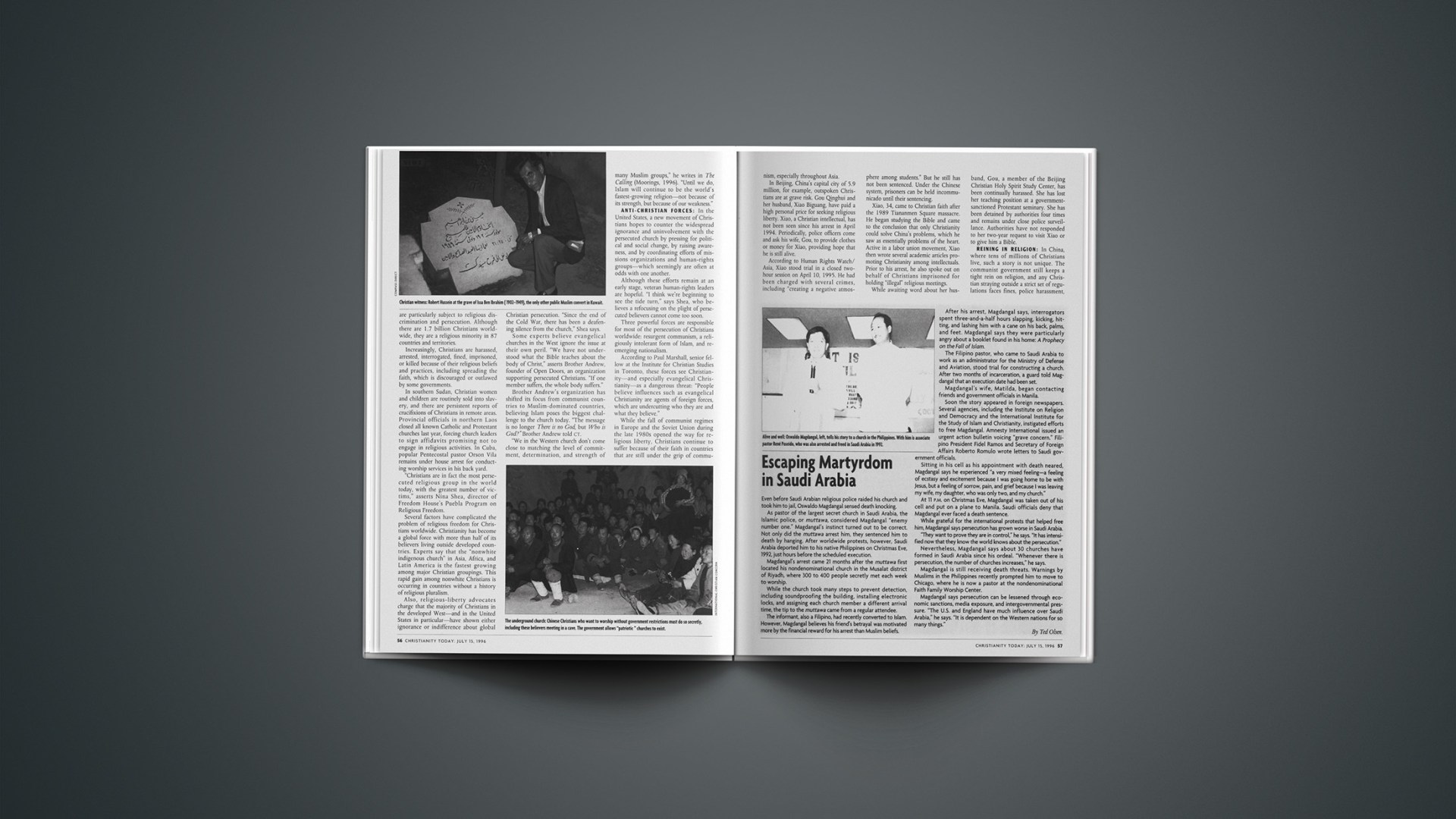Even before Saudi Arabian religious police raided his church and took him to jail, Oswaldo Magdangal sensed death knocking.
As pastor of the largest secret church in Saudi Arabia, the Islamic police, or muttawa, considered Magdangal “enemy number one.” Magdangal’s instinct turned out to be correct. Not only did the muttawa arrest him, they sentenced him to death by hanging. After worldwide protests, however, Saudi Arabia deported him to his native Philippines on Christmas Eve, 1992, just hours before the scheduled execution.
Magdangal’s arrest came 21 months after the muttawa first located his nondenominational church in the Musalat district of Riyadh, where 300 to 400 people secretly met each week to worship.
While the church took many steps to prevent detection, including soundproofing the building, installing electronic locks, and assigning each church member a different arrival time, the tip to the muttawa came from a regular attendee.
The informant, also a Filipino, had recently converted to Islam. However, Magdangal believes his friend’s betrayal was motivated more by the financial reward for his arrest than Muslim beliefs.
After his arrest, Magdangal says, interrogators spent three-and-a-half hours slapping, kicking, hitting, and lashing him with a cane on his back, palms, and feet. Magdangal says they were particularly angry about a booklet found in his home: A Prophecy on the Fall of Islam.
The Filipino pastor, who came to Saudi Arabia to work as an administrator for the Ministry of Defense and Aviation, stood trial for constructing a church. After two months of incarceration, a guard told Magdangal that an execution date had been set.
Magdangal’s wife, Matilda, began contacting friends and government officials in Manila.
Soon the story appeared in foreign newspapers. Several agencies, including the Institute on Religion and Democracy and the International Institute for the Study of Islam and Christianity, instigated efforts to free Magdangal. Amnesty International issued an urgent action bulletin voicing “grave concern.” Filipino President Fidel Ramos and Secretary of Foreign Affairs Roberto Romulo wrote letters to Saudi government officials.
Sitting in his cell as his appointment with death neared, Magdangal says he experienced “a very mixed feeling–a feeling of ecstasy and excitement because I was going home to be with Jesus, but a feeling of sorrow, pain, and grief because I was leaving my wife, my daughter, who was only two, and my church.”
At 11 p.m. on Christmas Eve, Magdangal was taken out of his cell and put on a plane to Manila. Saudi officials deny that Magdangal ever faced a death sentence.
While grateful for the international protests that helped free him, Magdangal says persecution has grown worse in Saudi Arabia.
“They want to prove they are in control,” he says. “It has intensified now that they know the world knows about the persecution.”
Nevertheless, Magdangal says about 30 churches have formed in Saudi Arabia since his ordeal. “Whenever there is persecution, the number of churches increases,” he says.
Magdangal is still receiving death threats. Warnings by Muslims in the Philippines recently prompted him to move to Chicago, where he is now a pastor at the nondenominational Faith Family Worship Center.
Magdangal says persecution can be lessened through economic sanctions, media exposure, and intergovernmental pressure. “The U.S. and England have much influence over Saudi Arabia,” he says. “It is dependent on the Western nations for so many things.”
Copyright © 1996 Christianity Today. Click for reprint information.










